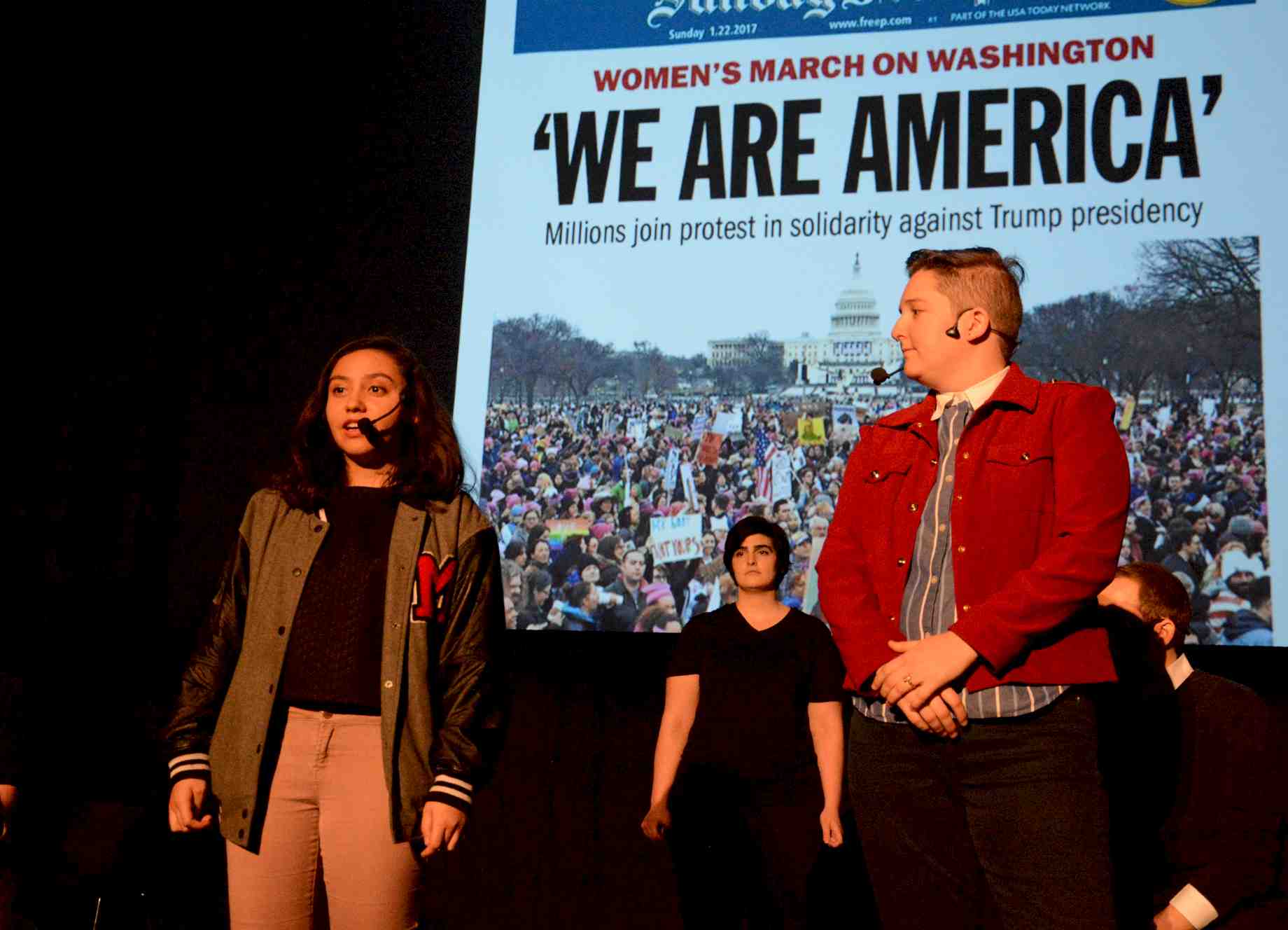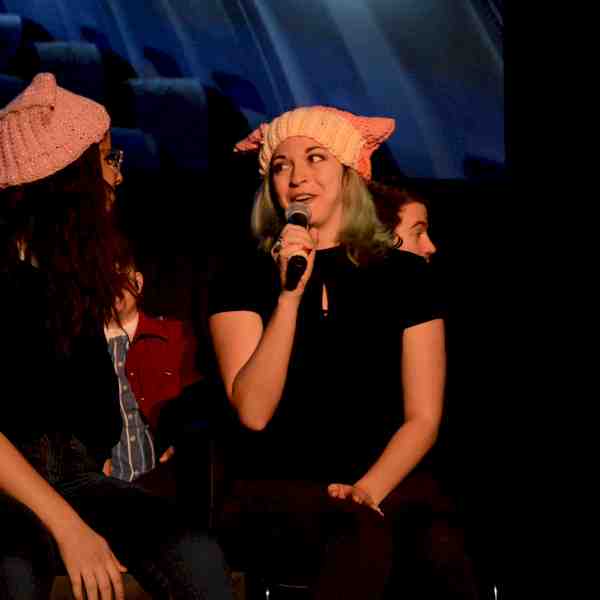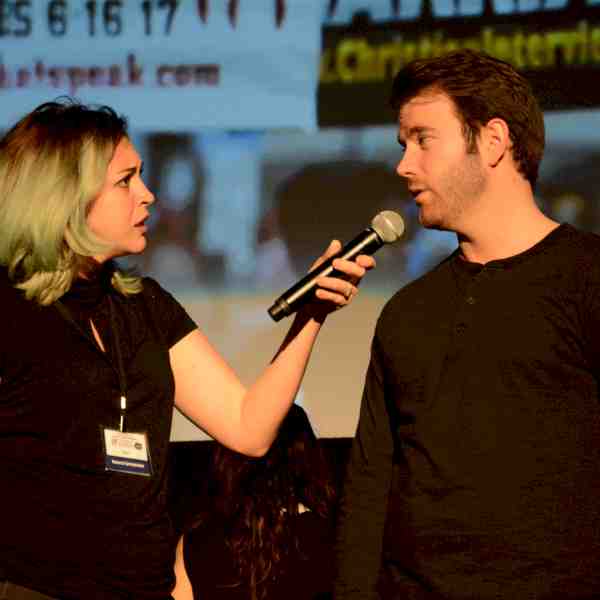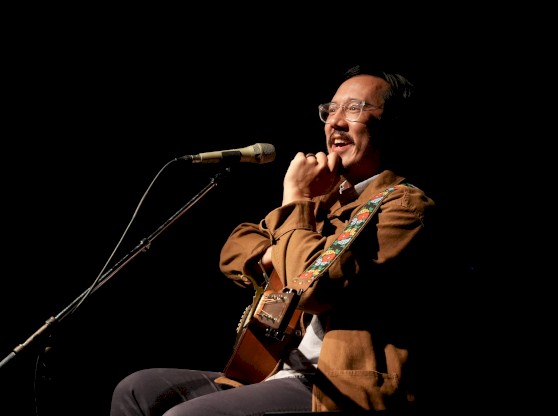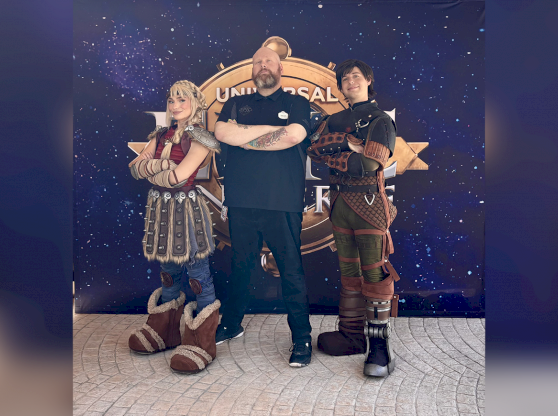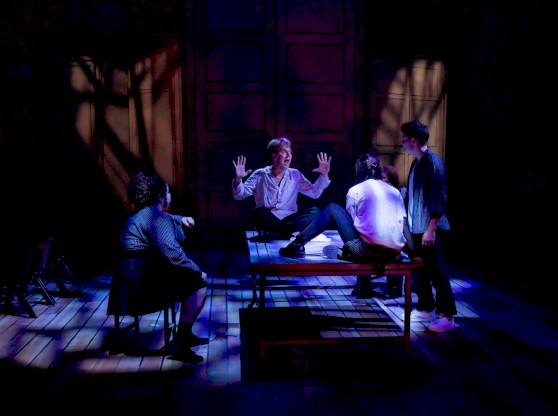Under the direction of Jeffrey Pufahl, the College of the Arts presented the premier of the documentary play Voices from the March in January 2018 during the closing ceremonies of the University of Florida 2018 Social Justice Summit.
Voices from the March pieces together the experiences of UF students and staff involved in the Women’s March On Washington: Experiential Learning Oral History Project. A collaboration between the Samuel Proctor Oral History Program (SPOHP) and the Center for Gender, Sexualities, and Women’s Studies Research, UF students and staff collected interviews as oral historians during the 2017 presidential inauguration and the subsequent Women’s March on Washington.
Pufahl, a faculty member in the Center for Arts in Medicine since 2015, first became interested in the potential for a stage adaptation after attending a panel discussion led by the students and staff who had collected these interviews. He applied and received a Creative Campus Scholar in Residence award from the provost’s office to spend a year in SPOHP developing the play.
As part of an Oral History Performance for Social Justice internship in SPOHP, Pufahl began his residency working closely with a small group of students and interns to create a script combining excerpts of their archived interviews with their own reflections and confessional statements.
Holland Hall was one of the students involved in this piece since the project’s inception as the research coordinator for the Women's March on Washington Experiential Learning Fieldwork Trip.
“I have no experience writing or performing in plays, apart from, of course, elementary school experiences,” said Hall, a first year Master of Education/Education Specialist student in mental health counseling.
Still, Hall was excited by Pufahl’s theatrical vision for their oral history project.
“When I received word that our experiences were being turned into a theatrical performance piece, I knew I wanted to be involved,” Hall said.
Together, Pufahl, Hall and the others constructed a compelling and daring script that transformed the oral history project into a live multimedia performance. Pufahl kept the students and their process of documenting and internalizing their experiences at President Donald Trump’s inauguration and the Women’s March on Washington at the heart of Voices from the March.
“I wanted the play and the students to explore what ultimately became the theme of the march itself: intersectional identity,” he said. “Their story of documenting the march was as prominent to me as the interviews they collected. What they discovered and how the experience changed and redefined them was really the focus of the playwriting process, because that’s what identity is: understanding who we are in the world.”
Since its roaring performance at the UF 2018 Social Justice Summit, Voices from the March has been invited to be performed at multiple events throughout the spring 2018 semester, including the UF Undergraduate Research Symposium and the Southwest Oral History Association Conference at California State University, Fullerton. In October 2018, Pufahl and his cast will be traveling back to his home country of Canada to perform at the 2018 Oral History Association Annual Meeting in Montreal.
Pufahl’s primary area of research with CAM has been in applied theatre for health and health promotion. He has created an Applied Theatre for Health two-year certificate program for all majors who wish to explore ethnographic and applied theatre as well as storytelling. CAM plans to launch the program in fall 2019.
“This work engages both students and the public by approaching social issues, health issues and community issues through theatre and video,” Pufahl said. “Applied theatre has been used widely in mental health treatment, education and research translation and can help students develop communication strategies, self-esteem and presentation skills.”
In addition to Voices from the March, Pufahl developed two other projects with CAM in the 2017-18 academic year: Theatre Connect!, a theatre program for LGBTQ teens, and Inside OCD: I am not my illness, a storytelling program for individuals living with OCD. Inside OCD was presented through UF Performing Arts and was featured at the International OCD Foundation Conference in D.C.
In most of these projects, Pufahl sees himself simply as a facilitator and documentarian trying to provide students with an outlet to express themselves.
“This work can really be potent because—for those who are making it—it invites an inward, reflective and critical process as well as an expressive and connective process,” he said. “I want to create the conditions for collaboration, introspection, inspection and critical dialogue. If we can see the basic humanity that’s in all of us, we can see that we are more alike than we are different.”
Pufahl is especially proud of the activism he has been able to promote through these outreach theatre projects.
“It feels more gratifying to create a complex piece of theatre and reach a much larger audience than to engage in Facebook arguments,” he said, “not that Facebook activism a bad thing, but I think ethnographic theatre asks us to really define who we are and then have the courage to put that out into the world.”
